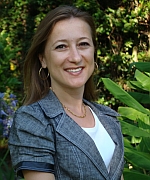Sandrine Dudoit

Division of Biostatistics and Department of Statistics, University of California, Berkeley
United States
http://www.stat.berkeley.edu/~sandrine
Presentation Title: Identification of Novel Cell Types in the Brain Using Single-Cell Transcriptome Sequencing
Time: Monday, July 11th 9:00 am - 10:00 am
Introduction by: Janet Kelso
Room: Northern Hemisphere BCD, Dolphin Hotel
Abstract
Single-cell transcriptome sequencing (scRNA-Seq), which combines high-throughput single-cell extraction and sequencing capabilities, enables the transcriptome of large numbers of individual cells to be assayed efficiently. Profiling of gene expression at the single-cell level for a large sample of cells is crucial for addressing many biologically relevant questions, such as, the investigation of rare cell types or primary cells (e.g., early development, where each of a small number of cells may have a distinct function) and the examination of subpopulations of cells from a larger heterogeneous population (e.g., classifying cells in brain tissues).
I will discuss some of the statistical analysis issues that have arisen in the context of a collaboration funded by the Brain Research through Advancing Innovative Neurotechnologies (BRAIN) Initiative, with the aim of classifying neuronal cells in the mouse somatosensory cortex. These issues, ranging from so-called low-level to high-level analyses, include: experimental design, exploratory data analysis (EDA) of scRNA-Seq reads, quality assessment/control (QA/QC), normalization to account for nuisance technical effects, cluster analysis to identify novel cell types, and differential expression analysis to derive gene expression signatures for the cell types.
Biography
Sandrine Dudoit is Professor of Biostatistics and Statistics and Chair of the Graduate Group in Biostatistics at the University of California, Berkeley. Her methodological research interests regard high-dimensional inference and include exploratory data analysis (EDA), visualization, loss-based estimation with cross-validation, and multiple hypothesis testing. Her methodological work is motivated by statistical inference questions arising in biological research and, in particular, the design and analysis of high-throughput microarray and sequencing gene expression experiments. She is also interested in statistical computing and reproducible research. She is a founding core developer of the Bioconductor Project.
Professor Dudoit is a co-author of the book "Multiple Testing Procedures with Applications to Genomics" and a co-editor of the book "Bioinformatics and Computational Biology Solutions Using R and Bioconductor". She was named Fellow of the American Statistical Association in 2010 and Elected Member of the International Statistical Institute in 2014.
Professor Dudoit obtained a Bachelor's degree (1992) and a Master's degree (1994) in Mathematics from Carleton University, Ottawa, Canada, and a PhD degree (1999) in Statistics from UC Berkeley. Before joining the Faculty at UC Berkeley in July 2001, she underwent two years of postdoctoral training in the laboratory of Professor Patrick O. Brown, Department of Biochemistry, Stanford University.




